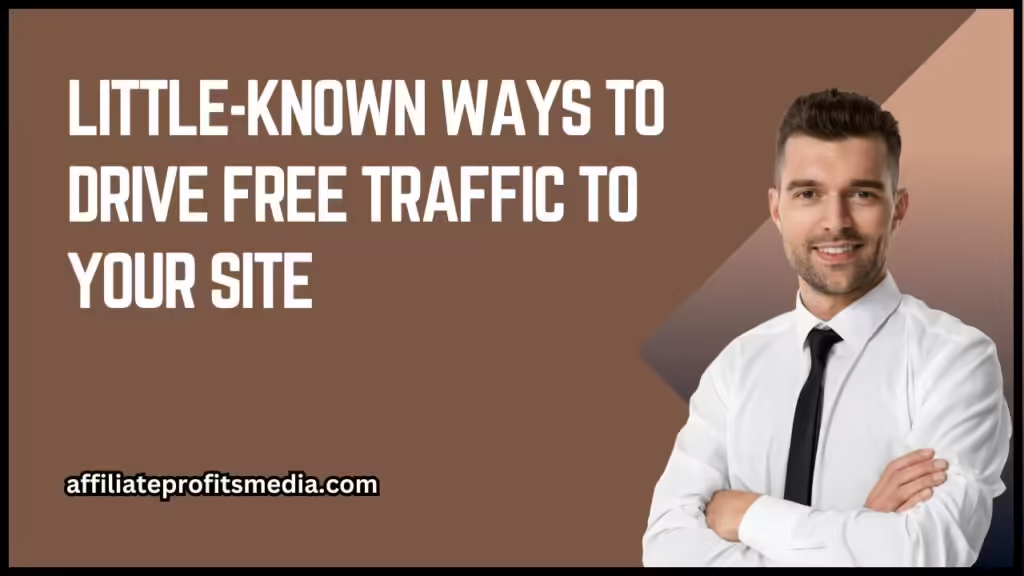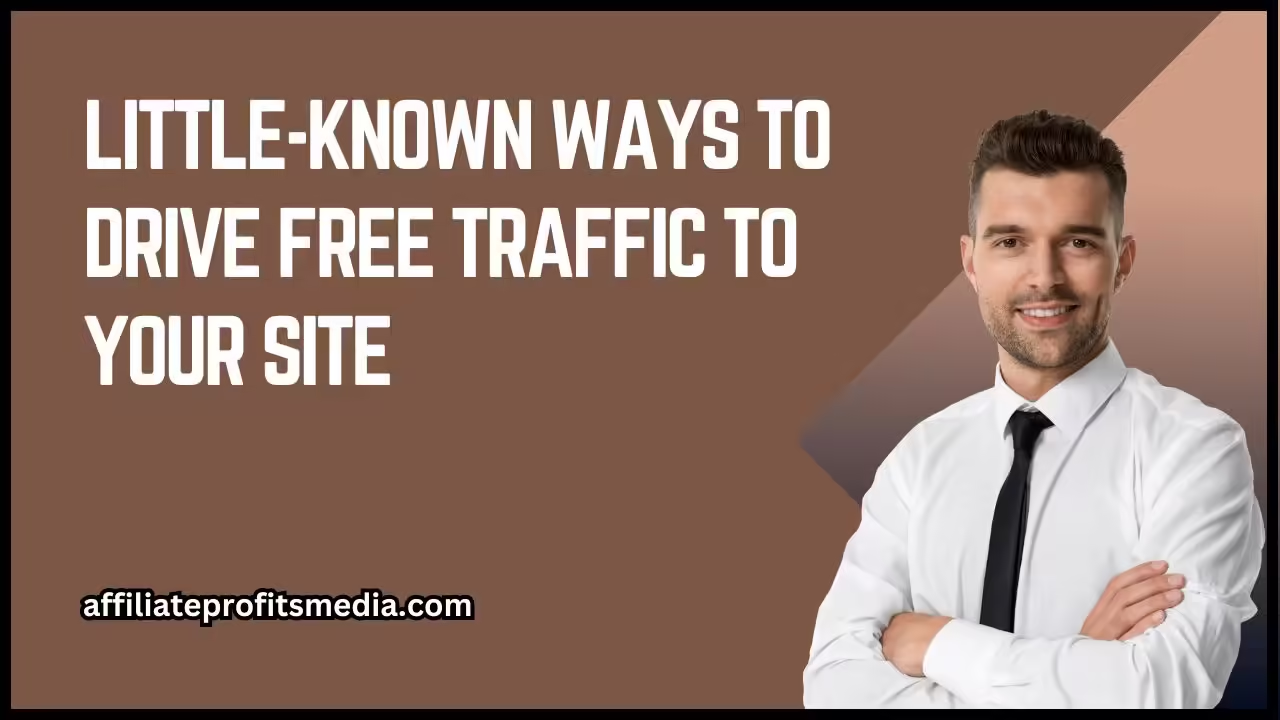Welcome to my article on Little-Known Ways to Drive Free Traffic to Your Site,In the world of affiliate marketing, standing out among competitors can be challenging. Long-tail keywords—phrases with three or more words that target specific user intents—offer a way to connect with niche audiences and improve your visibility. By focusing on long-tail keywords, affiliate marketers can increase search traffic, conversions, and revenue. Here’s how using long-tail keywords can boost your affiliate marketing results.
>> Here’s the Proven Way to Make $100-$200 Daily with 0 Investment – Watch This FREE Video and Start Now >>

1. Reduce Competition and Rank Higher (Free Traffic)
Long-tail keywords are typically less competitive than broad, single-word keywords, making it easier to rank higher in search engine results. Ranking for specific phrases like “best running shoes for flat feet women” instead of just “running shoes” helps you appear on page one more quickly. Less competition means your content is more likely to be discovered by users, driving organic traffic to your site.
2. Target Highly Relevant Audiences
Long-tail keywords are more specific, often matching the exact needs or questions of users. This relevance helps attract audiences who are already interested in your niche, improving the chances of converting visitors into buyers. For instance, a keyword like “best vegan protein powder for muscle gain” targets a precise audience interested in both veganism and fitness, increasing your conversion potential.
3. Increase Conversion Rates (Free Traffic)
Users who search with long-tail keywords typically have a clear intent and are closer to making a purchase decision. By addressing these specific queries, your content can guide users down the sales funnel more effectively. For example, someone searching for “affordable laptops for graphic design” is likely ready to buy if presented with the right product recommendations. Catering to this intent directly can lead to higher conversion rates for your affiliate products.
4. Enhance Content Relevance and Quality
Incorporating long-tail keywords can improve the relevance and quality of your content by addressing specific pain points or interests. When you create content that answers detailed questions or provides niche solutions, you’re more likely to engage readers and encourage them to spend more time on your site. This, in turn, can boost your search engine rankings, as search engines favor in-depth, quality content.
5. Capture Voice Search Traffic (Free Traffic)
With the rise of voice-activated devices like Google Home and Alexa, more users are conducting searches in conversational phrases, often in the form of long-tail keywords. By optimizing for long-tail keywords, you increase the likelihood of capturing traffic from voice searches. This approach helps you stay relevant in a growing trend and reach a wider audience through search terms they naturally use.
6. Improve ROI on Paid Advertising
Long-tail keywords are usually more affordable in paid search campaigns, as they have less competition. By targeting specific long-tail keywords, you can optimize your ad spend and attract a more qualified audience. Lower costs and higher relevance mean you get a better return on investment (ROI) for your advertising budget, making paid ads more sustainable in the long run.
>> Here’s the Proven Way to Make $100-$200 Daily with 0 Investment – Watch This FREE Video and Start Now >>
Reduce Competition and Rank Higher (Free Traffic)
To improve your search ranking and stand out from competitors, here are six strategies to help you boost visibility and authority.
- Choose Niche Keywords: Opt for less competitive, niche-specific keywords. These phrases often attract a targeted audience, allowing for a better chance to rank higher.
- Create Unique, In-Depth Content: High-quality, comprehensive content that addresses user needs is more likely to rank well, especially when fewer competitors cover the topic extensively.
- Use Long-Tail Keywords: Long-tail keywords tend to be less competitive and attract a more specific audience, which can enhance ranking potential.
- Focus on Local SEO: Optimize for local searches to reduce competition. Adding local keywords and setting up a Google My Business profile can help with local visibility.
- Enhance User Experience (UX): Ensure your site loads quickly, is mobile-friendly, and provides easy navigation to retain users and lower bounce rates.
- Build Quality Backlinks: Gaining backlinks from reputable sources signals search engines that your content is valuable, boosting rankings. Free Traffic
Reducing competition through targeted strategies can significantly improve your site’s ranking, helping you reach the right audience effectively.
Target Highly Relevant Audiences
Reaching a highly relevant audience is essential for improving engagement, conversions, and ROI. Here are seven ways to connect with the right audience effectively.
- Define Your Ideal Customer: Identify demographics, interests, and behaviors of your target audience for sharper focus in your marketing efforts.
- Use Data-Driven Insights: Analyzing data from past campaigns provides valuable information on what content resonates most with your audience.
- Employ Behavioral Targeting: Use behavior-based ads to engage users based on their past interactions, ensuring your content aligns with their interests.
- Leverage Social Media Targeting: Platforms like Facebook and Instagram offer targeting options based on location, interests, and activity, enabling precision in audience reach.
- Personalize Email Marketing: Segment your email list based on user preferences and behaviors to deliver more relevant content. Free Traffic
- Create Content for Specific Audiences: Tailor content for each segment, addressing their unique needs and questions to build engagement.
- Use Retargeting Ads: Engage users who have previously interacted with your content, increasing the likelihood of conversion.
Targeting highly relevant audiences ensures your marketing efforts reach the right people, driving better engagement and results.
Increase Conversion Rates (Free Traffic)
Boosting conversion rates is crucial for maximizing marketing impact. Here are seven ways to optimize your strategy.
- Optimize Landing Pages: Ensure your landing pages are visually appealing, easy to navigate, and focused on a single call-to-action (CTA) to prevent distractions.
- Clear and Persuasive CTAs: Make your CTAs clear, action-oriented, and prominent on the page to encourage immediate action from visitors.
- A/B Testing: Regularly test variations of headlines, CTAs, images, and content layout to see what performs best with your audience. Free Traffic
- Leverage Social Proof: Show testimonials, reviews, or case studies to build trust and credibility, encouraging potential customers to convert.
- Reduce Form Fields: Keep forms short and only ask for essential information, making it easier for users to complete the desired action.
- Offer Incentives: Providing discounts, free trials, or bonuses can motivate hesitant customers to take action.
- Optimize for Mobile: Ensure your site and forms are mobile-friendly, as more users make decisions and complete transactions on their smartphones.
Implementing these strategies can help you increase conversions, turning more visitors into satisfied customers and improving your business outcomes.
>> Here’s the Proven Way to Make $100-$200 Daily with 0 Investment – Watch This FREE Video and Start Now >>
Enhance Content Relevance and Quality
Creating relevant, high-quality content is essential for engaging your audience and boosting SEO. Here are six tips to elevate your content’s impact.
- Know Your Audience: Research your target audience’s interests and pain points. This ensures your content addresses topics that matter to them.
- Focus on Value: Offer actionable insights, tips, or solutions in each piece of content. Readers are more likely to engage with content that provides them with real benefits.
- Use Keyword Optimization: Integrate relevant keywords naturally to improve visibility on search engines while keeping readability in mind.
- Incorporate Visuals: Use images, infographics, or videos to make your content more appealing and break up text, enhancing user experience.
- Update Regularly: Refresh older content with new information, stats, or examples to keep it accurate and valuable for readers. Free Traffic
- Encourage Interaction: Add prompts for readers to comment, share, or participate, boosting engagement and adding depth to the content.
Improving content relevance and quality can attract a larger, more engaged audience, making your content efforts more successful and sustainable.
Capture Voice Search Traffic (Free Traffic)
Voice search is changing how people look for information, making it essential for businesses to adapt. Here are seven ways to optimize for voice search traffic.
- Use Natural Language: Voice searches are more conversational. Write content that mimics how people speak, making it more likely to appear in voice results.
- Focus on Long-Tail Keywords: Voice searches are often longer and more specific. Target long-tail keywords that match these searches.
- Optimize for Questions: Many voice searches are question-based. Create content that answers common questions in your niche.
- Provide Direct Answers: Voice assistants often pull short, concise answers from content. Use clear headings and provide straightforward answers in your content.
- Create a FAQ Page: A dedicated FAQ page is perfect for capturing voice search traffic as it directly addresses user queries. Free Traffic
- Improve Page Load Speed: Voice search users want quick results. Optimize your page loading speed to keep your site accessible.
- Use Structured Data: Schema markup helps search engines understand your content better, improving chances of appearing in voice search results.
Optimizing for voice search can drive more targeted traffic to your site, allowing you to engage a growing audience using this technology.
Improve ROI on Paid Advertising
Improving ROI on paid advertising helps maximize your ad budget’s impact. Here are seven strategies to get the best results.
- Define Clear Goals: Set measurable objectives to track ad success and ensure campaigns align with business targets.
- Target the Right Audience: Use detailed demographics and interests to ensure ads reach potential customers who are likely to convert.
- Optimize Ad Creative: Invest in high-quality, engaging visuals and ad copy that resonates with your target audience, improving click-through rates.
- Leverage A/B Testing: Run tests on different versions of ads to determine which elements drive higher engagement and conversions.
- Use Retargeting: Re-engage visitors who didn’t initially convert by showing them tailored ads, which can increase the chances of conversion.
- Analyze Performance Regularly: Continuously monitor ad metrics to see which ads perform best and adjust strategies accordingly.
- Adjust Bidding Strategies: Use data to adjust bids for different audiences, maximizing ad exposure to those with the highest conversion potential.
Refining your paid advertising approach can significantly improve ROI, making every dollar spent more impactful in reaching your goals.
Conclusion
Using long-tail keywords in your affiliate marketing strategy allows you to rank higher, attract targeted traffic, and increase conversions. From capturing voice search traffic to enhancing the relevance of your content, long-tail keywords offer a range of benefits that drive results. Embracing this approach helps you connect with a more engaged audience and boosts your affiliate marketing success, positioning your content for long-term growth.
>> Here’s the Proven Way to Make $100-$200 Daily with 0 Investment – Watch This FREE Video and Start Now >>
Thank you for taking the time to read my article “Little-Known Ways to Drive Free Traffic to Your Site”, hope it helps!













